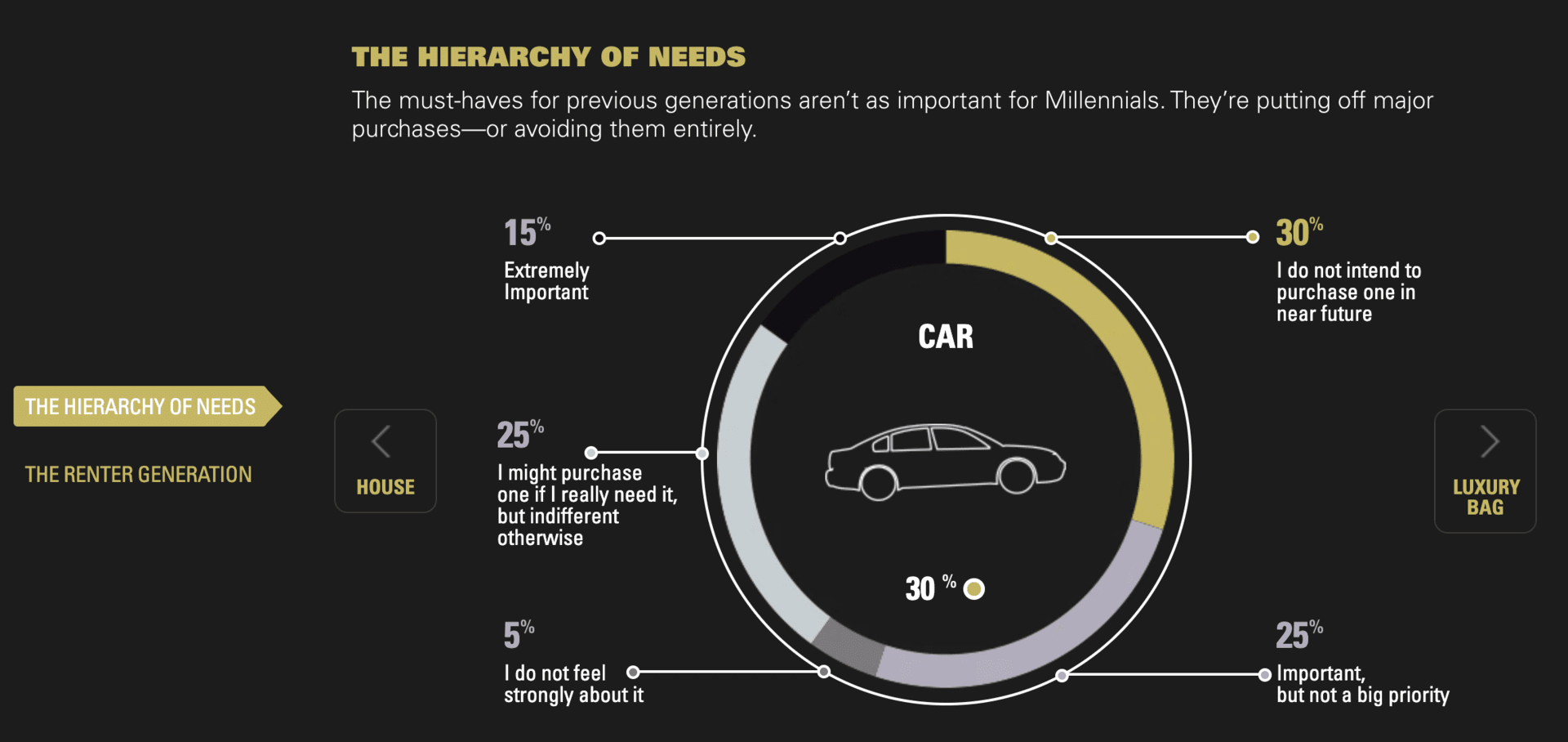Chances are you’ve probably heard of the sharing economy, the still growing socio-economic system that traces its rise back to the Great Recession. Well, millennials have taken the sharing economy to the next level with a movement that Forbes has dubbed NOwnership.
NOwnership – a portmanteau of “no” and “ownership” – is a movement by younger generations away from owning things in favor of sharing them within their community, or relying on a service that provides what they need, when they need it.
It’s especially attractive for younger generations because foregoing the ownership of objects is more sustainable and economically advantageous. Sharing instead of buying requires fewer financial resources, gives items more usage, and coexists well with overcrowded or even cramped urban dwellings.
This might be why the sharing model works so well in cities and urban environments. Citizens already deal with a lack of space and resources – e.g. apartment space, parking spaces, higher rent, expensive appliances, tools or vehicles – so having the option to save money while still getting the things one needs makes a lot of economic sense.
Millennials and younger generations don’t want to own cars
This is especially true for car ownership. A study from Goldman Sachs has shown that millennials are increasingly reluctant to buy big ticket items, like cars and luxury goods. Instead, they are making use of the sharing economy for mobility, where they can access vehicles like cars, scooters, and bikes whenever they need them and without having to own them.

30% of millennials surveyed said they don’t intend to purchase a private car in the near future. 25% deemed car ownership not a big priority, and a further 25% were indifferent.
This goes to show that the NOwnership is having a serious impact on the mobility and transportation industries – and the vehicle sharing market is growing accordingly. American economic writer and theorist Jeremy Rifkin says that, “25 years from now, car sharing will be the norm, and car ownership an anomaly.”
The true costs of car ownership
There are considerable costs that go into car ownership: fuel, maintenance, taxes, insurance. However a recent survey found that most Germans severely underestimate the true cost of owning a car.
On average, those surveyed underestimated the total costs of owning a car by €221 ($240) per month. That amounts to 52% of the actual costs – meaning that the real, total cost is almost double that what people think it is.
“25 years from now, car sharing will be the norm, and car ownership an anomaly.”
The impact of car ownership and vehicle sharing on the environment
Owning a car isn’t just a financial burden, it has an immense impact on the environment as well.
Recent findings from the International Energy Agency reveal that transportation is currently the biggest producer of energy-related CO₂ emissions at 24%, or 8 billion tons of CO₂. Nearly 75% of those transport emissions come from road vehicles.
These values are so high because a significant amount of commuters still rely on their privately owned cars to get to work. A reported 70% of Germans still use a car for their commutes – even though nearly 28% of daily commutes are under 5km, and nearly 50% are under 10km, as the same report revealed.
It may be disappointing to see how many people still rely on the outdated car ownership model, even though it no longer makes much financial and environmental sense. The tides are turning, however, and vehicle sharing is growing as a viable alternative to car ownership that can also have a positive impact on the environment and on urban landscapes.
One big benefit of NOwnership and car sharing is that it eliminates the need for parking spaces. An MIT study estimates that vehicle sharing can reduce parking spaces in cities by 86%, freeing up valuable areas for green projects for citizens. And on the sustainability front, the combination of car sharing, public transport and bike sharing could save up to 3,500 tons of CO₂ per day alone in Germany.
Vehicle sharing is the future of mobility
As the EU Green Deal aims for the reduction of carbon emissions by 55% by 2030, cities and commuters should look increasingly towards shared mobility as a proven way to reach their own sustainability goals.
It’s also what the new generations prefer in terms of interacting with goods and services. Entrepreneurs and mobility veterans should take note: giving up car ownership for shared mobility is where the market is headed. Those who don’t get on board get left behind.
